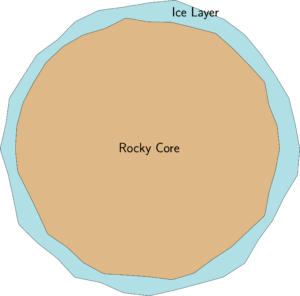Two hundred years in the future, humanity has colonized the Sol System -- Mars, the Moon, the Asteroid Belt, and some of the Outer Planets -- in the TV series The Expanse. Resources are scarce on Earth and the planet relies heavily on resources from the Belt to run its global economy. Despite migrating to space, mankind is in turmoil. Earthers see themselves as above most other groups in the Sol System and are openly prejudiced against those not born on the planet, particularly those born in the Asteroid Belt -- the Belters. To some, Belters are not considered human.
Earth is one of the dominant powers in the series and their attitudes affect many of the economic and trade policies of the system, especially where water -- the most valuable resource in the system -- is concerned. Earth's control of the system's water allows the planet to maintain a grip on other parts of the system. Mars' lack of resources also means that they need resources from the Belt to survive and they too find ways to exert control over Belters. The mineral-rich outer planets, in turn, resent their dependence on Earth and Mars and the political and military clout they wield over the Belt and beyond.

"When you spend your whole life living under a dome, even the idea of an ocean seems impossible to imagine."
To get the water it needs for its economy, Earth corporations mine several asteroids in the Belt, most notably the dwarf planet Ceres. It makes sense that this particular dwarf planet would be an ideal candidate for mining. With an average diameter of 946 km (587 miles), it is the largest known object in the asteroid belt that lies between Earth and Jupiter. It is also the largest minor planet within Neptune's orbit. Composed of rock and ice, it is estimated to be one-third the mass of the entire asteroid belt.
Oceans on Mars

Ceres is a roughly spherical dwarf planet with a rocky core covered with ice. There is enough ice to provide Mars with an ocean
In the episode "QCB," Martian Congressional Republic Naval (MCRN) officer Lieutenant Lopez (Greg Bryk) tells James Holden (Steven Strait) that he can not imagine his planet ever having oceans despite the terraforming currently taking place on the red planet. That does not mean that such a feat is impossible. A quick calculation shows that Ceres has enough ice to make the dream of Martian oceans possible.
So how much ice does Ceres have anyway? Ceres is roughly spherical and covered with an approximately 100 km (62.1 miles) thick layer of ice. This accounts for some 200 million cubic kilometers of ice, about the volume of the Indian Ocean. Mars is over half the size of Earth, with a surface area that is about 38% of Earth's. This may seem small but Mar's total surface area is equivalent to the dry land area on Earth.
If we were to take all of Ceres' ice and dump it on Mars, we could definitely use it to create the Martian oceans that Lopez dreams about. The question is whether Earth would allow this. The obvious answer is no. If this crazy plan were implemented, Ceres' ice would give Mars the equivalent of half of Earth's ocean volume to surface area ratio. As there are no oceans on Mars, it is easy to understand why Mars is permanently pissed at Earth - the planet takes most of the resources of the solar system for themselves leaving little for Martians and Belters.
War is Envitable
It is easy to see why tensions exist in the Expanse universe. Earth, instead of sharing the abundant resources of the Solar System, has taken most of the mineral wealth for itself. Calculations show there is a considerable amount of ice on Ceres, and some demagogues in the series complain that the asteroid used to have enough water for everyone -- but not anymore. The events that kickstart the series, the destruction of the Canterbury and the subsequent anger that spreads across the Belt, is not the reason why a civil war might start, it is simply the catalyst. The systemic discrimination, oppression, exploitation of Belters across the system already exists and that is the main reason for revolt.
Acknowledgement: Thanks goes out to Anthony Barker from Purdue University for the idea behind this article.
Also published on Medium.




